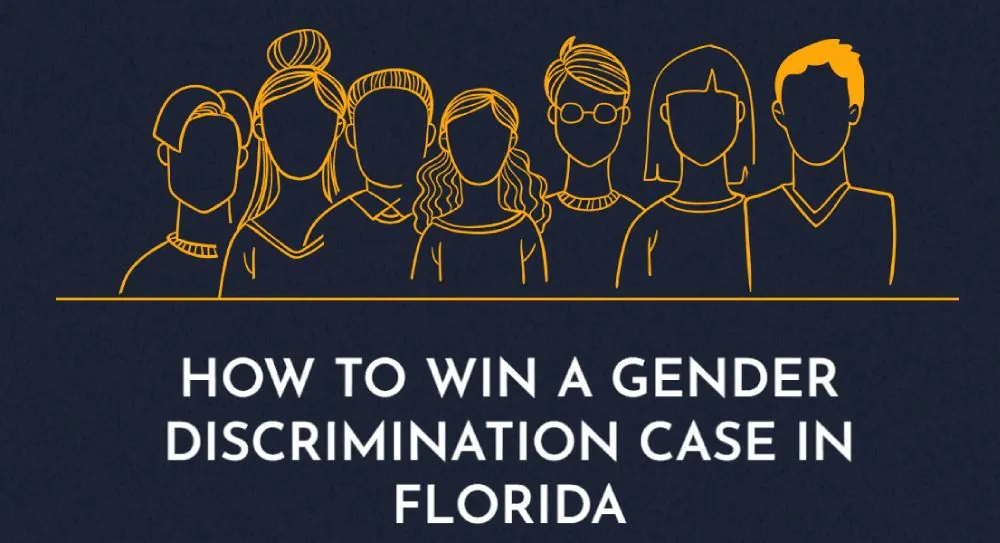
Your sex, your gender, your sexual orientation—none of these characteristics should keep you from finding a job or receiving the respect you deserve at work. While employers are prohibited from engaging in sex-based or gender-based discrimination against their employees, many still violate state and federal anti-discrimination laws. With the help of a good attorney, you can make an employer pay for its unlawful behavior.
Gender discrimination cases are challenging, but you are entitled to damages if you are a victim of discrimination. And if you need help with how to win a gender discrimination case in Florida, our experienced employment attorneys at Brenton Legal PA can give you the best chance at victory in a claim.
Workplace Discrimination and the Florida Civil Rights Act of 1992
The Florida Civil Rights Act of 1992 and the Federal Civil Rights Act of 1964 outlaw discrimination in work settings. These laws also give victims of discrimination avenues to seek remedies for any harm they suffer.
Who Is Protected Against Gender Discrimination and Other Bias?
Florida and federal laws forbid employers from taking adverse actions against job candidates or employees for any of the following reasons:
- National origin,
- Religion,
- Disability,
- Sex,
- Race,
- Pregnancy,
- Age (40 or older),
- Marital status,
- Color, or
- Genetics.
If an employer mistreats an employee or applicant because of one of the above-listed protected characteristics, it might have to pay significant financial damages and make changes to its practices and policies.
What Is an Adverse Employment Action?
What counts as unlawful mistreatment that could subject an employer to legal penalties? The following workplace actions are illegal if they are motivated by bias against a protected class:
- Job termination,
- Harassment,
- Elimination or reduction of benefits,
- Denial of promotion,
- Negative performance review,
- Unwanted job transfer,
- Reduction in pay,
- Undesirable work assignments,
- Demotion,
- Failure to hire, and
- Unequal payment.
An employer is also liable for unlawful retaliation if it harasses or punishes an employee for helping with a discrimination investigation or asserting their rights against an employer’s violations of the law.
What Qualifies as Gender Discrimination in the Workplace?
Gender discrimination cases in the workplace fall under the umbrella of sex-based discrimination that is prohibited by federal and state laws. Sex-based discrimination can include unequal or poor treatment on the basis of a person’s sex, gender identity, sexual orientation, or pregnancy. This type of discrimination can be subtle or obvious and direct or indirect.
How to Win a Gender Discrimination Case by Enforcing Your Rights
The US Equal Employment Opportunity Commission (EEOC) reports that it found no reasonable cause in over 60% of sex-based discrimination claims from 2020. This highlights the difficulty of initiating and maintaining a discrimination claim. We do not share this information to discourage you from enforcing your rights but to prepare you for the obstacles you will likely face.
If you want to know how to win a gender discrimination lawsuit or how to win discrimination case in Florida, the first thing you should do is contact one of our knowledgeable employment discrimination attorneys at Brenton Legal.
In many cases, the difference between victory and loss in legal action against gender discrimination is preparation and organization. Our skilled attorneys can help ensure that your case is handled properly and given the appropriate attention. And our attorneys can help you take the following crucial steps to increase your chances of winning your lawsuit or complaint.
Ask Questions to Uncover Gender Discrimination in the Workplace
Sometimes an employer says outright that it is treating an employee unfairly for illegal and discriminatory reasons. But employers are usually more secretive about their unlawful motivations and biases. You will likely have to prove gender discrimination by showing that you were treated differently than similarly situated coworkers who do not share the same sex or gender expression as you. And you get to this proof by asking questions.
If someone less qualified than you receives a promotion that you applied for and did not receive, ask why you were denied the job. If you receive a negative performance evaluation, politely inquire about your employer’s reasons for your low scores.
Getting these answers from the beginning can help you uncover evidence that can poke holes in your employer’s story once you get to a legal setting. For instance, if an employer cites the handful of times that you were tardy as a reason for denying you a promotion, you can start tracking whether any of your colleagues who are chronically late have received professional advancements that you have not.
Establish Boundaries to Combat Gender Discrimination and Harassment
If you are a victim of workplace harassment based on your gender, proving that the harassing behavior you endured was unwelcome is vital to your case. If you can, tell your harasser to stop their offensive behavior as soon as it occurs. And if shutting down your harasser is exceptionally challenging because of who they are or the type of harassment they commit, report the harassment to a trusted supervisor as soon as possible.
Gather Evidence to Prove Gender Discrimination Immediately
Whenever you suspect that gender discrimination is at play, gather evidence regarding the misconduct and the circumstances of your employment. Evidence you should gather includes the following:
- Witness information,
- Correspondence,
- Detailed notes about each instance of discrimination,
- Employer policies and agreements,
- Pictures, and
- Employment records.
Whatever relevant evidence you cannot legally collect on your own can be accessed by your attorney.
Need help winning a gender discrimination case in Florida? Contact the attorneys at Brenton Legal today.
File an Internal Complaint for Workplace Discrimination
Before you seek remedies in a trial or hearing, you might need to file an internal complaint against a discriminatory supervisor. This is especially likely in harassment cases. Also, you might be able to resolve your workplace dispute internally.
Review your employer’s complaint policies and consult with your attorney about how to proceed with a complaint at work. And if you file a complaint, keep copies of what you submit to the investigating authorities and the outcome of the investigation. This can be vital information in other legal settings.
Filing an Administrative Complaint or a Gender Discrimination Lawsuit
Some workplace grievances cannot be resolved within the workplace, and that is when it is time to take your objections to outside authorities. You can recover damages and other legal relief in a discrimination case by doing the following:
- Filing a discrimination charge with the EEOC,
- Filing a discrimination complaint with the Florida Commission on Human Relations (FCHR), or
- Filing a lawsuit in civil court.
In many cases, you have only 180 days to file an EEOC charge and only 365 days to file an FCHR complaint, so you must act quickly. An attorney can handle these timelines for you and maximize your recovery.
Need Help Proving or Winning a Gender Discrimination Case? Contact Brenton Legal
You deserve excellent legal support when you have faced mistreatment in the workplace. And you can find that support at Brenton Legal. We are experienced employment discrimination attorneys serving Florida, and we are passionate about protecting employee rights. We are also straightforward. We know individuals in the workforce do not have time to waste, so we give our clients objective feedback from the beginning regarding the strengths and weaknesses of their claims. For a free consultation, call us at 954-639-4644 or contact us online.

